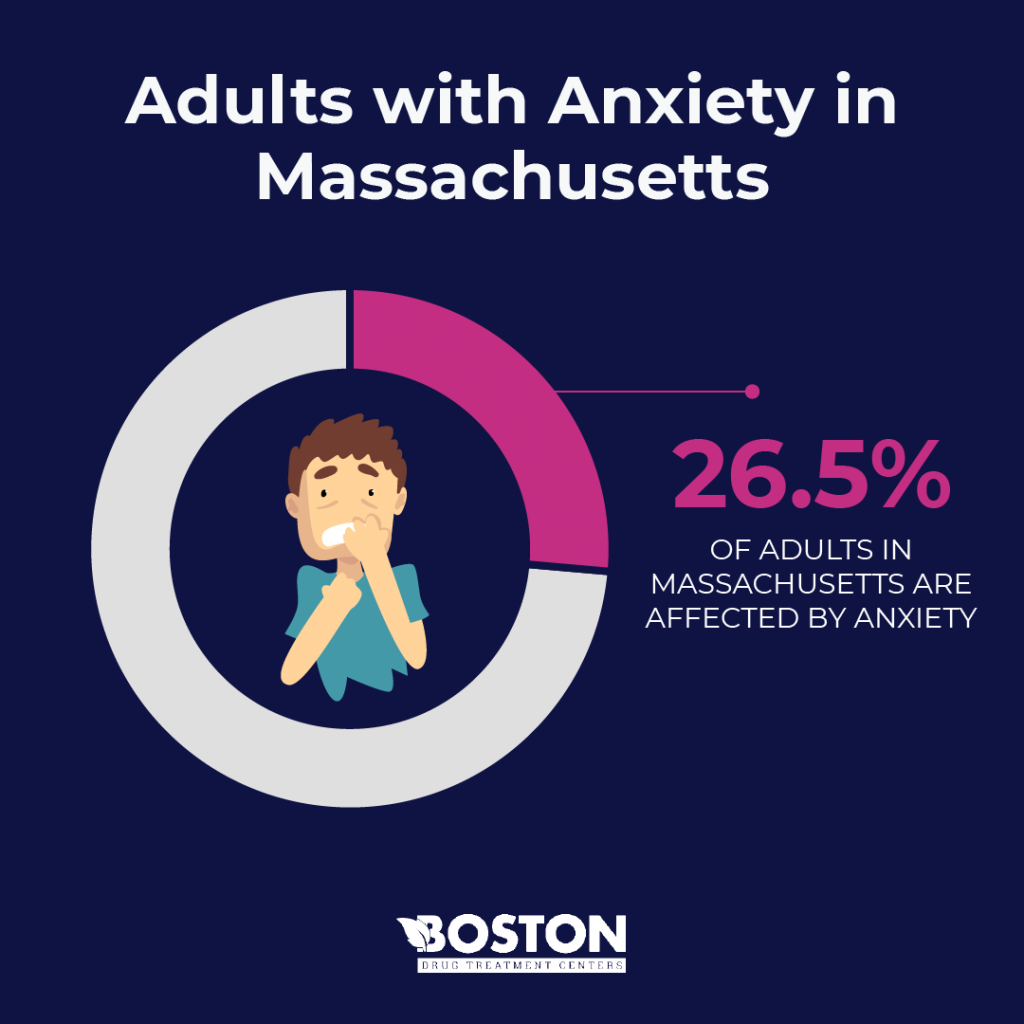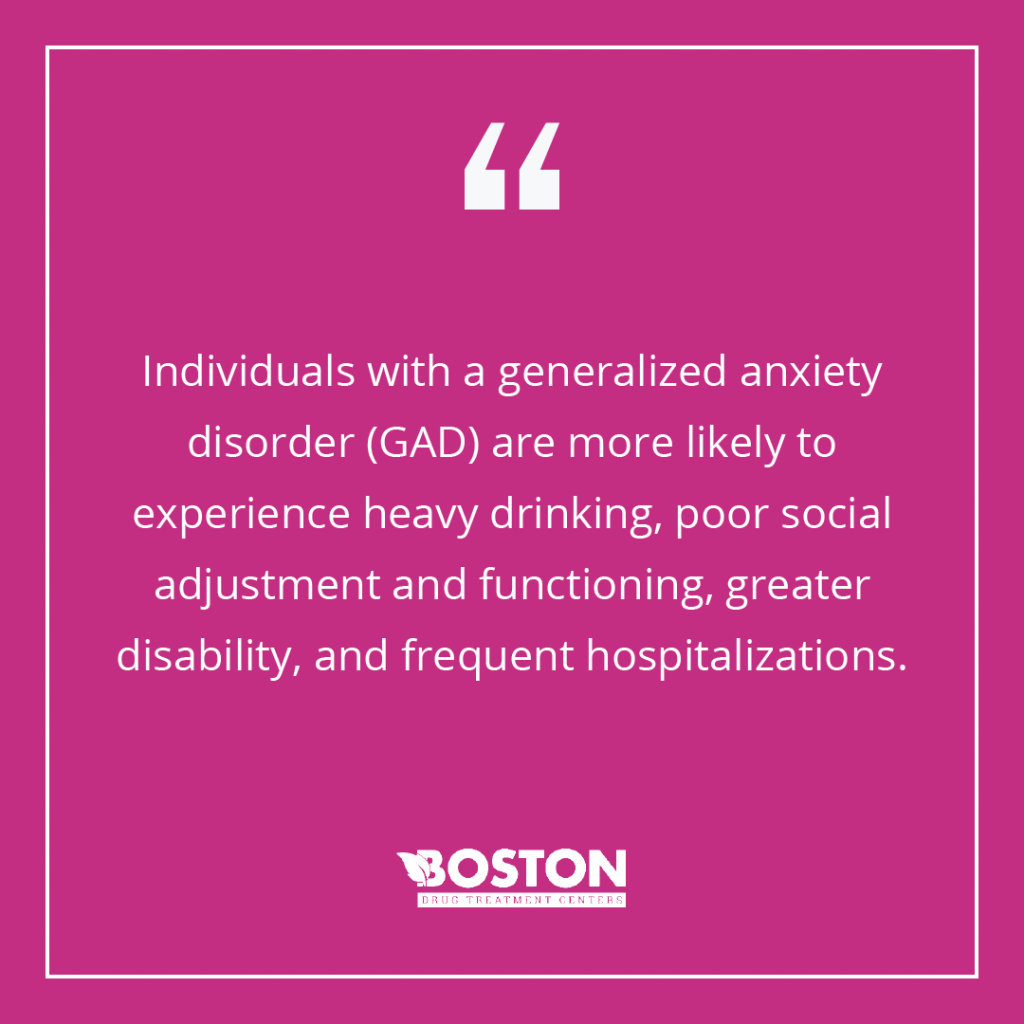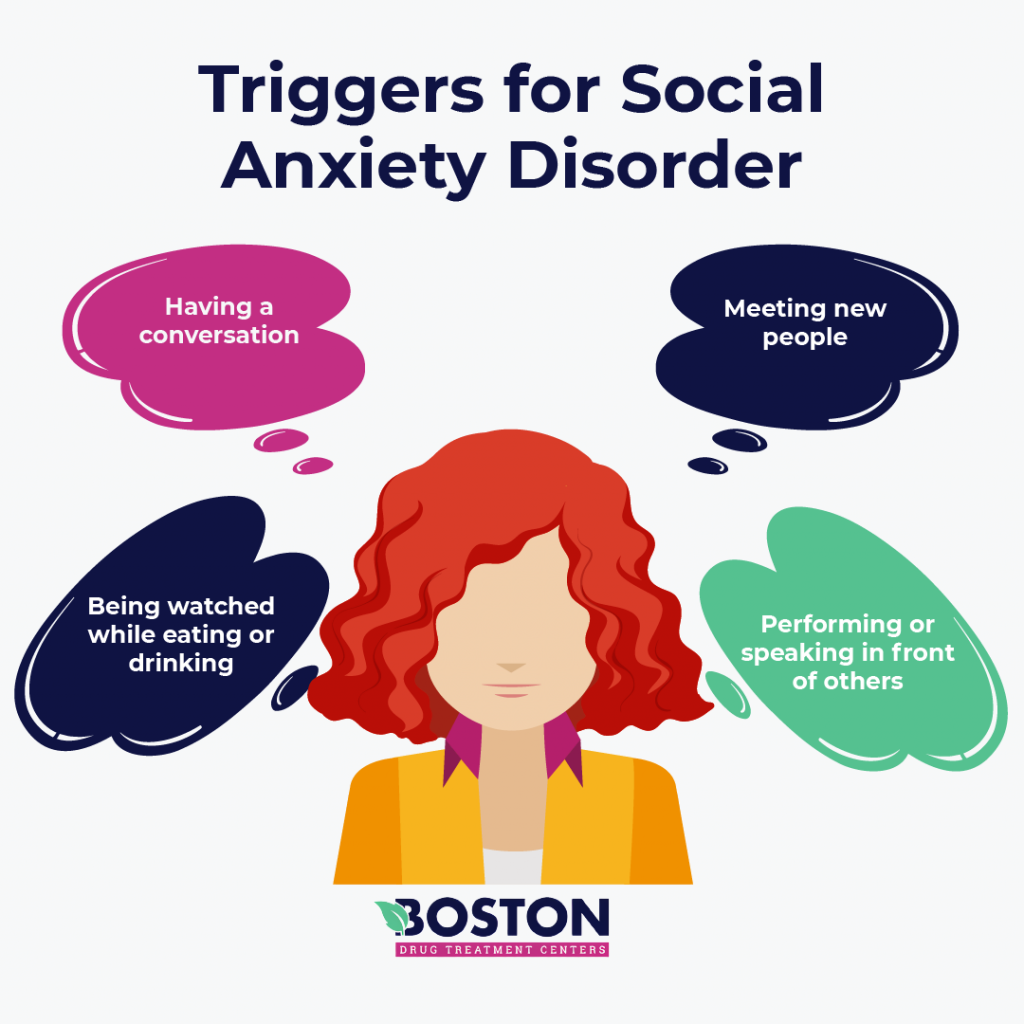One in 13 people around the world experience an anxiety disorder but only a third seek treatment.1 According to a 2021 U.S. Census Bureau survey, during the COVID-19 pandemic 26.5% of adults living in Massachusetts reported experiencing symptoms of anxiety.2
Substance abuse and anxiety frequently occur together. For example, addiction and posttraumatic stress disorder are closely linked, and individuals with substance use disorders (SUD) have a higher likelihood of co-occurring PTSD.3 This combination can significantly interfere with treatment outcomes, leading to more severe symptoms, early treatment drop-out, and a greater risk for relapse.3
Anxiety does not go away on its own. Without treatment, symptoms usually worsen over time. If you struggle with co-occurring conditions, finding a dual diagnosis treatment program in Boston can dramatically improve your recovery.

Drug and alcohol addiction often co-occur with mental health conditions like anxiety. Anxiety disorders are characterized by ongoing fear and worry on most days for at least six months.4 Identifying which type of anxiety disorder you are experiencing is the first step in the recovery process.
Individuals with panic disorder suffer from frequent panic attacks—sudden surges of intense fear or emotional discomfort. Panic attacks can be mild or extreme but often get worse without treatment.
Signs and symptoms of panic attacks:5
Some people also experience neck soreness, ringing in the ears, uncontrolled screaming or crying episodes.

Individuals with separation anxiety disorder experience excessive fear or anxiety when separated from home or an attachment figure. In many people, anxiety occurs even when an absence is merely anticipated. Separation is a normal stage of childhood development, but parental overprotection and intrusiveness may be associated with a higher prevalence of this disorder.5
Signs and symptoms of separation anxiety disorder:5
Social anxiety disorder (social phobia) involves the fear of being negatively judged or scrutinized by others, especially in social situations. Technology can also trigger social anxiety. With the increasing use of video-based software, technostress has become more common.9
Triggers associated with social anxiety disorder:5

The central theme of SAD is the fear of being embarrassed, humiliated, or rejected. Individuals with this disorder will often self-isolate, which leaves them at a greater risk for depression.
Many anxiety-related disorders share common characteristics. For example, disruptions in emotional regulation appear to play a significant role in both PTSD and SUD.3 Similarly, obsessive compulsive disorder (OCD) and PTSD often have overlapping signs and symptoms, however they are classified as trauma-and-stressor-related disorders rather than anxiety disorders.
Conversely, people who misuse substances often develop secondary anxiety due to neurological changes in the brain.10 This can seriously complicate the treatment and recovery process because symptoms of anxiety may also worsen during withdrawal.
While there is a strong association between anxiety and substance abuse, the cause isn’t as clear. Anxiety disorders are often diagnosed at a younger age than SUDs, but that alone does not mean anxiety disorders cause substance abuse.11 The drivers behind anxiety and substance abuse appear to be multifactorial.
Risk factors for co-occurring anxiety and substance abuse include:12
Anxiety and addiction often create a cyclical pattern, and individuals who live with the conditions face constantly changing moods and anxiety levels. For this reason, diagnosing substance use disorder when anxiety disorder is also present can be difficult.6 Determining whether a person’s anxiety symptoms are caused by the substance itself or due to withdrawal from the substance is not always clear.
Nearly half of individuals who live with substance use disorders also experience a co-occurring mental disorder, such as anxiety.13 Anxiety and substance use disorders also occur at higher rates in individuals with bipolar II disorder than in the general population.5 For example, 75% of patients with bipolar II disorder also have anxiety.5
Early treatment is crucial because sustained anxiety may lead to higher rates of impulsivity, longer duration of illness, higher suicide rates, and poorer response to treatment.5 When a substance use disorder is present, it can also decrease the recovery rate of GAD.14
When substance use disorder co-occurs with an anxiety disorder, it’s known as a dual diagnosis.12
The World Health Organization first used the term “dual diagnosis” in the 1990s to describe the co-occurrence of substance use disorder with other mental illnesses.6 The term “co-occurring disorder” is used more frequently today.
Integrated treatments address multiple conditions simultaneously.11 This integrated treatment approach includes both pharmacological and psychotherapeutic elements.6 Inadequate treatment of one or both disorders can increase the risk of relapse, so treating co-occurring conditions in tandem is a more holistic approach that improves outcomes.
For the best possible outcomes, your dual diagnosis treatment program should be tailored to your specific needs. Before recommending a treatment, your specialist will assess the following during your intake evaluation:
The following approaches may be included in your dual diagnosis treatment program:
If you or someone you love struggles with anxiety and co-occurring substance abuse, our recovery support specialists at Boston Drug Treatment Centers can guide you toward the help you need. Call our helpline today at 617-517-6448.
Anxiety does not directly cause substance misuse, but some people use substances to self-medicate or reduce symptoms of anxiety.
There is no cure for anxiety, but it can be treated and managed successfully.
Substance misuse can lead to increased anxiety levels in some people, especially during withdrawal. For this reason, it’s important to seek help from specialists who have training in dual diagnosis treatment.
For those seeking addiction treatment for themselves or a loved one, our calls are confidential and are available for 24/7 help.
Calls from your area will be answered by Legacy Healing Center, and network of treatment centers who can be found here www.rehabsnearyoudisclosures.com
We are available 24/7 to discuss your treatment options. Our representatives work for a treatment center and will discuss whether their facility may be an option for you.
These calls are offered at no cost to you and with no obligation to enter into treatment. Neither this site nor anyone who answers the call receives a commission or fee dependent upon which treatment provider a visitor may ultimately choose.
If you wish to explore additional treatment options or connect with a specific rehab center, you can: browse top-rated listings, visit our homepage, or visit SAMHSA, at www.samhsa.gov, or by calling 800-662-HELP. You may also contact The Florida Department of Children and Family Services at https://www.myflfamilies.com/